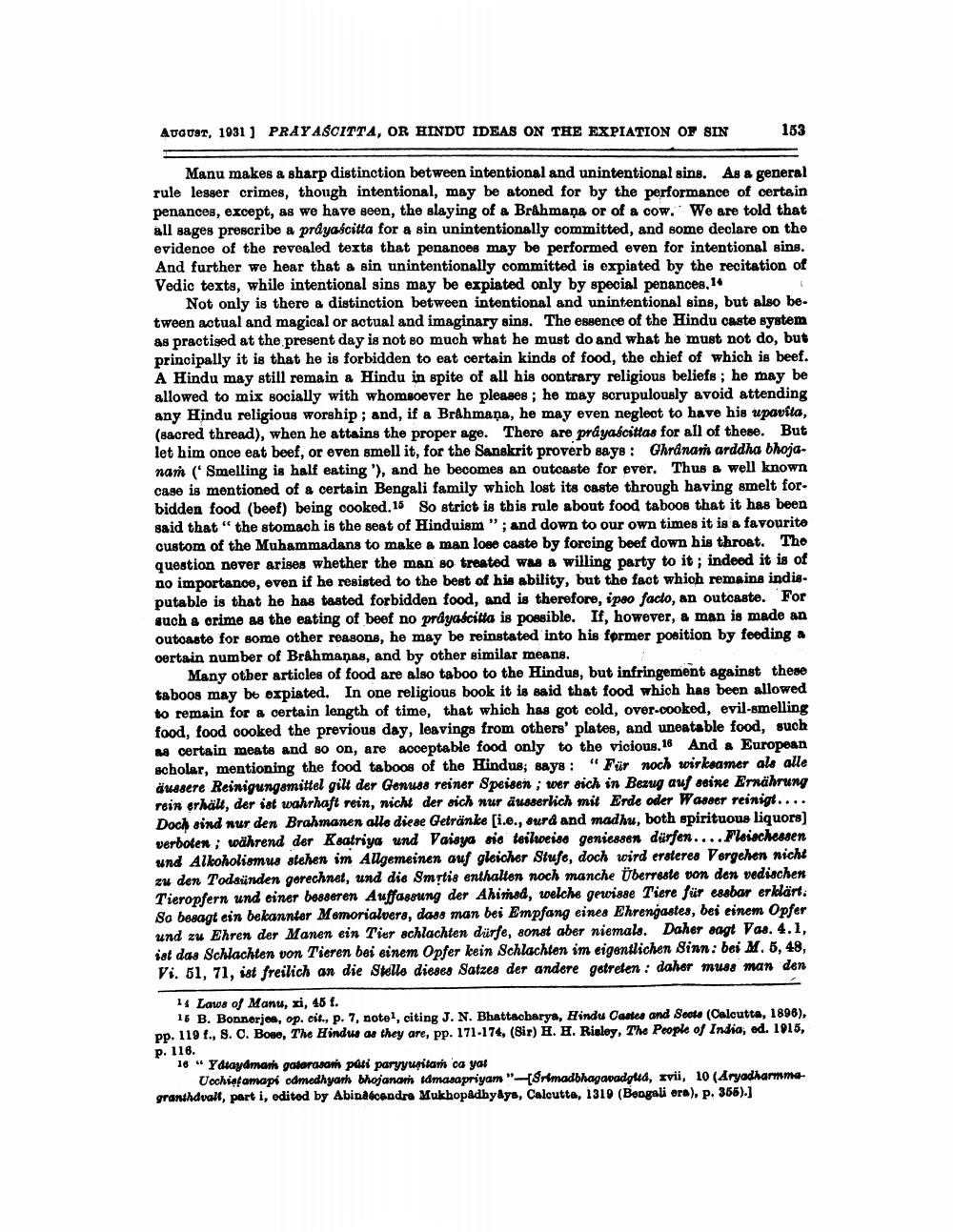________________
August, 1931 ] PRAY ASCITTA, OR HINDU IDEAS ON THE EXPIATION OF SIN
153
Manu makes a sharp distinction between intentional and unintentional sins. As a general rule lesser crimes, though intentional, may be atoned for by the performance of certain penances, except, as we have seen, the slaying of a Brahmana or of a cow. We are told that all sages prescribe a prdyascitta for a sin unintentionally committed, and some declare on the evidence of the revealed texts that penanoes may be performed even for intentional sins. And further we hear that a sin unintentionally committed is expiated by the recitation of Vedic texts, while intentional sins may be expiated only by special penances, 14
Not only is there a distinction between intentional and unintentional sins, but also between actual and magical or actual and imaginary sins. The essence of the Hindu caste system as practised at the present day is not so much what he must do and what he must not do, but principally it is that he is forbidden to eat certain kinds of food, the chief of which is beef. A Hindu may still remain a Hindu in spite of all his contrary religious beliefs ; he may be allowed to mix socially with whomsoever he pleases; he may scrupulously avoid attending any Hindu religious worship; and, if a Brahmana, he may even neglect to have his upavita, (sacred thread), when he attains the proper age. There are prayascittas for all of these. But let him once eat beef, or even smell it, for the Sanskrit proverb says: Ghranam arddha bhojanam (Smelling is half eating '), and he becomes an outcaste for ever. Thus a well known case is mentioned of a certain Bengali family which lost its caste through having smelt for. bidden food (beef) being cooked. 15 So strict is this rule about food taboos that it has been said that "the stomach is the seat of Hinduism"; and down to our own times it is a favourite custom of the Muhammadans to make a man lose caste by forcing beef down his throat. The question never arises whether the man so treated was a willing party to it; indeed it is of no importance, even if he resisted to the best of his ability, but the fact which remains indisputable is that he has tasted forbidden food, and is therefore, ipso facto, an outcaste. For such a crime as the eating of beef no prdyascitta is possible. If, however, a man is made an outoaste for some other reasons, he may be reinstated into his former position by feeding a oertain number of Brahmanas, and by other similar means.
Many other articles of food are also taboo to the Hindus, but infringement against these taboos may be expiated. In one religious book it is said that food which has been allowed to remain for a certain length of time, that which has got cold, over-cooked, evil-smelling food, food cooked the previous day, leavings from others' plates, and uneatable food, such as certain meats and so on, are acceptable food only to the vicious. 16 And a European scholar, mentioning the food taboos of the Hindus, says: "Für noch wirksamer als alle äussere Reinigungsmittel gilt der Genuss reiner Speisen ; wer sich in Bezug auf seine Ernährung rein erhält, der ist wahrhaft rein, nicht der sich nur äusserlich mit Erde oder Wasser reinigt.... Doch sind nur den Brahmanen alle diese Getränke [i.e., surd and madhu, both spirituous liquors) verboten ; während der Ksatriya und Vaisyo sie teilweise geniessen dürfen....Fleischessen und Alkoholismus stehen im Allgemeinen auf gleicher Stufo, doch wird ersteres Vorgehen nicht zu den Todsünden gerechnet, und die Smộtis enthalten noch manche Überreste von den vedischen Tieropfern und einer besseren Auffassung der Ahinsd, welche gewisse Tiere für essbar erklärt. So besagt ein bekannter Memorialvers, dass man bei Empfang eines Ehrengastes, bei einem Opfer und zu Ehren der Manen ein Tier schlachten dürfe, sonst aber niemals. Daher sagt Vas. 4.1, ist das Schlachten von Tieren bei einem Opfer kein Schlachten im eigentlichen Sinn: bei M. 5, 48, Vi. 51, 71, ist freilich an die Stelle dieses Satzes der andere getreten: daher muss man den
1. Laws of Manu, xi, 45 f.
16 B. Bonnorjon, op. cit., p. 7, notel, citing J. N. Bhattacharya, Hindu Castes and Scoto (Calcutta, 1896), pp. 119 f., S. O. Bovo, The Hindu as they are, pp. 171-174, (Sir) 8. H. Risley, The People of India, ed. 1915, p. 116. 16 " Yataydman galera.com puti paryyupitan ca yat
Uochiatamapi odmedhyarh Bhojanom idmanapriyam" -Srimadbhagavadgled, xvii, 10 (Aryadharmmegranthdvalt, part i, edited by Abina candra Mukhopadhyâys, Calcutta, 1319 (Bengali ora), p. 355).]




